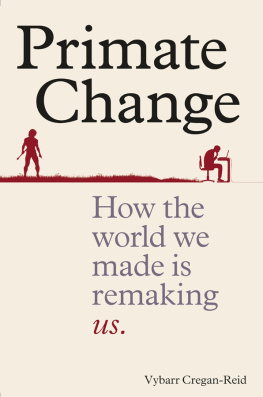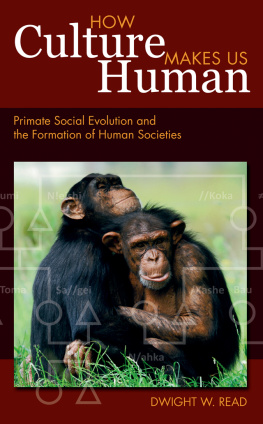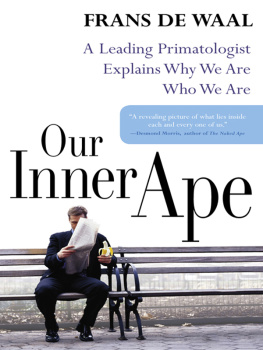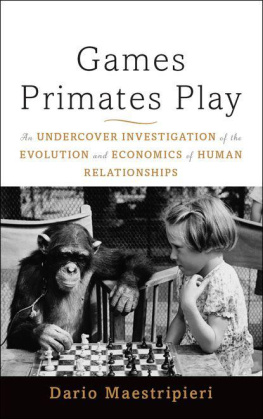Primate Behavior 
Primate Behavior

Sarah Lindsay
 For Mom and Dad
For Mom and Dad
who gave me books Copyright 1997 by Sarah Lindsay All rights reserved. No part of this book may be reproduced in any form or by any electronic or mechanical means, including information storage and retrieval systems, without permission in writing from the publisher, except by a reviewer, who may quote brief passages in a review.
Published simultaneously in Canada
Printed in the United States of America FIRST PAPERBACK EDITION Library of Congress Cataloging-in-Publication Data Lindsay, Sarah, 1958
Primate behavior / Sarah Lindsay.
p. cm. (Grove Press poetry series)
eBook ISBN-13: 978-0-8021-9675-0
I. Title.
PS3562.I51192P75 1997
811.54dc21 97-11821 The author wishes to thank George Bradley and Kay Ryan for their generous and perspicacious help.
Grateful acknowledgment is made to the following publications, in which these poems first appeared: The Cream City Review: Superman in Sunglasses; Georgia Review: So Were the Animals, Whether or Not a Giraffe Lies Down to Sleep; The New Republic: Dinosaur to Dragon; New Virginia Review: Primate Behavior; The Paris Review: Lungfish Conquers Depression, Neanderthal; The Plum Review: Musk Oxen Do Not Run Away; Poetry Motel: Of What Earth Has Eaten, Something May Yet Be Found; Prairie Schooner: Where Thieves Break In and Steal; Southwest Review: Alfred Russel Wallace in Venezuela; The Threepenny Review: Dido Summons the Beetles; The Yale Review: Aluminum Chlorohydrate DESIGN BY LAURA HAMMOND HOUGH Grove Press
841 Broadway
New York, NY 10003
I

By Luristan to Thule
Delirium was the last country she saw clearly. Mounting its exotic, riven flanks on the back of a patient fever, she left with regret the land of her hosts divisions of snow, upended stone threaded with tracks between the goatskin houses with goatskin beds then left too the regret. For decades shed taken pleasure in imposing the first white profile (with its great spinster nose) upon such places, barely named, as lay a few days journey beyond fable, uplands that bore no showy gold or ziggurat, only the shallow marks of laboring generations, the central campfires repeated deep in their eyes. Past rocks tipped early out of the cradle of myth, she finally became separated from her pack with its twenty pencils, the notorious hat, coins and aspirin, equally useless, and yielded to discovery of one state that lacks the primary luxuries: return, and the safely delivered story.
So Were the Animals
In that time, before the sun wore red and yellow feathers, before the skys umbilicus parted, the Machiguengas were people but so were the animals, so were the plants, so were the stars. Then Yabireri breathed on this one and that and made them toucans, cacao trees, orchids, or giant otters.
Until Yabireri blew his breath they were all people, consuming granite, changing red light to sugar, swallowing twelve-foot anacondas; they were all people, pushing each others eggs from the nest, streaming white fire that travels after they die, changing from male to female; they were all people, weaving houses of grasses and bright blue trash, folding dewlaps away and turning from orange to brown, lapping blood from the small wounds of sleepers, rolling themselves in balls, eating hot sulfur; they were all people. Two stopped the spirit god before he could change them all. There were still people to drink ayahuasca and rise to the spirits, to knit barbs in wire and string it wide, to write down endless numbers, to look into fire and sing till their eyes hurt and still sing, to dam rivers, to slit the belly of a thirteen-year-old girl, to tear a mountain open and let it rust, to trace an eyebrow with a wondering thumb, to make stories out of everything. There were still people Yabireri could not blow out. He watched from where they left him, impaled on a wooden stake at the mouth of the sky.
Constantinople, Plague Summer
Wind out of the north today, with the stench from the towers across the Horn, where the emperors men have packed the dead.
I danced for a man last night with black peas all over his arms. When I placed my hands on the floor, reaching over my head, he began to scream. Spilled red fish sauce, I think, ran over the table. I took all the food I could carry. Those the plague passes over are starving. I dreamt of ortolans in a pastry nest, woke to another slave bolting to drown his fever.
They say plum pickle wards it off, or lemons; they say God sends it. I think its part of the world that strikes and spares and never gives us the pattern. Tertia, our best, went first. They say the emperor prays all day. Some say he is dying. Hes sent for me, nonetheless.
No chin, like a rat, and his small hands are never still, but if any wine is left in the city hell have it, olives and figs to push between my breasts, perhaps little birds in a pie with fruit in their beaks or spitted with their eyes open.
The Angel That Troubled the Waters
Who started this none of them can say, not even those with tongues, but families hear of the angel that troubles the waters and deposit their last hopes beside the pool in ragged rings. And when the water ripples, what a surge among the patients, hunched over their pain in starting-line positions, the broad-shouldered lame, the sniffing blind, those clutching their bowels, their sores, their wild heads, even the limbless ones but its only a frog, or breeze, or a feather fallen from great height. They settle again, and continue to endure belief in an angel who might hold such a race and award but one prize. A small mercy that it was a moonless night when the angel of curiosity, meaning no harm, stirred the pool with one long finger, startled to taste how salt it is, and warm.
Hidden at the Zoo
At first the keepers amused themselves, pairing Mondrian with the zebras, El Greco with giraffes, but as rumors of the enemys approach grew heads and teeth, sleepless curators tried to run with straw-stuffed crates and thrust their arms into dangerous cages till half the museum was hidden at the zoo.
Throughout the occupation, the animals kept their secrets. But their boredom was more stubborn than a handful of hasty nails. The elephant delicately picked straw from the bust of Akhenaten; the blue-cheeked mandrill bared its fangs at the rival color patches of Rousseau. Brown bears bedded down for the winter in a cave lined with peaceable Rembrandts. At night the slow loris watched with its everlastingly startled eyes as the aye-aye touched its wire-thin long third finger to a rosy Renoir chin. In the reptile house a flying gecko established that its purple-brown toes adhered to Raphaels angels as to any wall, and the Indian long-nosed tree snake tested its rare binocular vision and the whisper of its ventral scales on the torso of an Apollonian youth.
As supplies ran short, one keeper discovered he didnt mind his koalas gnawing the frames of Renaissance triptychs. Another covered his face and cursed his cowardly hands as drunken soldiers played target practice, as the white rhino knelt, taking the bullets that could have pierced the Vermeer. A month later the broken aviary emptied, deserted by the orange minivet, the mandarin ducks, the blue-backed fairy bluebird, but the sociable weaverbirds stayed at their communal tree, and threaded the thatch of their nest with canvas strands to which clung flecks of paint, while next door in the butterfly house, the ripening eggs of
Next page












 For Mom and Dad
For Mom and Dad